What Does It Mean for a Guy to Call You Continuously After a Night One Stand
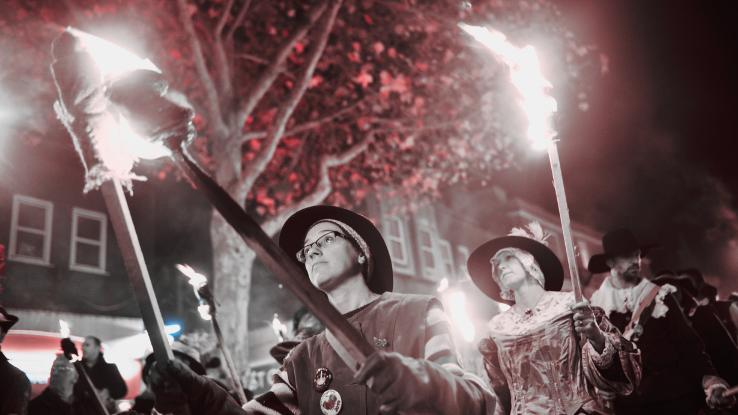
If you ever visit the United Kingdom in November, you might just hear about a holiday called Guy Fawkes Night, which is also known as Bonfire Night for a very clear reason. But what exactly is this annual occurrence — and why is it celebrated with bonfires and fireworks? Here, we're delving into these questions and more with a complete overview of Guy Fawkes Night to ensure that you'll always "remember, remember the fifth of November."
What Does Guy Fawkes Night Celebrate?
In short, the annual holiday is held each year on November 5 to commemorate the foiling of a plot that could have changed the course of British history. The holiday's origins go all the way back to 1605, when things were a bit tense — to say the least — between Protestants and Catholics.
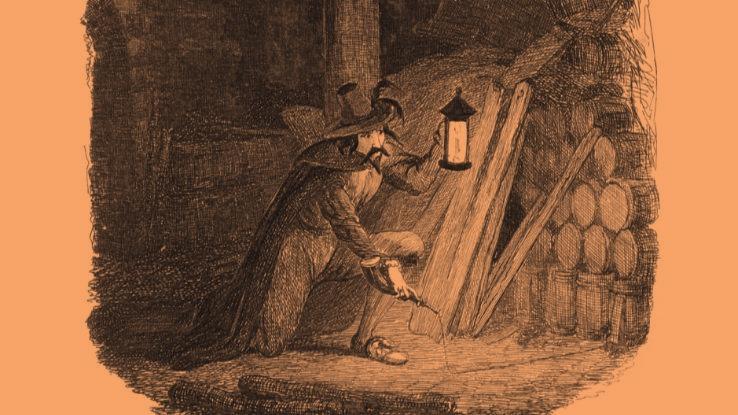
Back then, with religion being so integral to how a monarch ruled, it was life-changing to have a king or queen on the throne who held the same religious beliefs as you. At the time, King James I, a Protestant, was in power, which didn't sit well with his Catholic subjects. So, a few of these Catholic folks conceived of a treacherous plot to dethrone King James I.
Robert Catesby was actually the mastermind of what came to be known as the "Gunpowder Plot." His plan? Have co-conspirator Guido "Guy" Fawkes sneak 36 barrels of gunpowder into the cellar of the House of Lords — the unelected chamber of Parliament who often inherited their seats. Once the gunpowder had been planted, Guy Fawkes would light the fuses, killing not only those members of Parliament who happened to be in the chamber, but King James I, too.
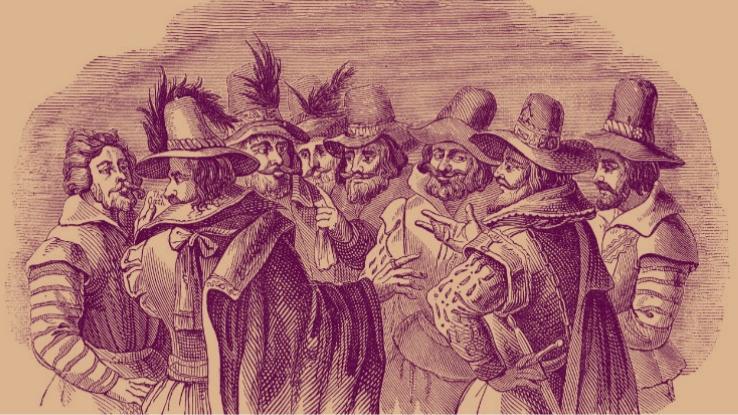
Fawkes, Catesby and the rest of their Catholic co-conspirators hoped that taking down the Protestant king would allow Catholic subjects to take more control over law-making and other government matters. Fawkes set up the explosives as planned — but that's as far as the plot went. One of the conspirators had a friend in Parliament and, unwilling to let the friend die, this person sent his friend a letter, warning him that the fifth of November would probably be a good night to stay home.
A Foiled Plot
As you might expect, things went downhill for the conspirators very quickly when the king's supporters got their hands on the letter and began to investigate. They discovered not only the gunpowder, but Fawkes — and those unlit fuses. Fawkes was arrested and brought in for questioning, which devolved into torture.
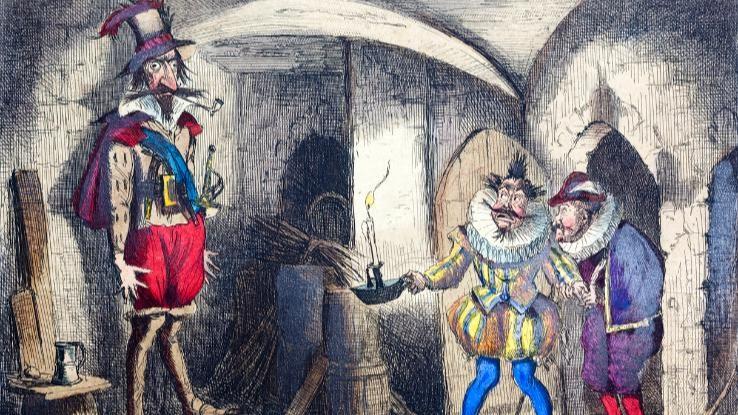
Ultimately, Fawkes broke down, providing the authorities with more information about the failed plot as well as the names of several of his co-conspirators. While some conspirators had already fled, those that remained attempted to stage an uprising, which did not go well. Those that survived the anarchist attempt were arrested and sentenced to a traitor's death.
Where Does "Remember, Remember the Fifth of November" Come From?
To this day, the failure of the Gunpowder Plot is still celebrated throughout the U.K. each November 5. This popular nursery rhyme actually sums up the reason for the season quite nicely: "Remember, remember the fifth of November, / Gunpowder treason and plot. / We see no reason / Why gunpowder treason/ Should ever be forgot."

Guy Fawkes Night is often celebrated with large bonfires, hence the alternate name, Bonfire Night. Unfortunately for Fawkes, an effigy made to look like him often tops off these fires. So, if you're ever in the U.K. on the fifth, you might just see an effigy (or several effigies) — often made of clothes stuffed with straw or paper and donning Fawkes' trademark black hat and cloak — go up in flames. In addition to bonfires, torchlit processions and fireworks are also common traditions that serve to symbolize the gunpowder that didn't change the course of history.
Bonfire Night's Other Traditions
Over the centuries, other traditions have become linked to Bonfire Night. The bonfires not only burn Guy Fawkes effigies — or, occasionally, those of modern-day political figures — but they are also used to cook potatoes, marshmallows, and sausages. Some bundled-up crowds even heat their soup over the flames.
Feeling dessert instead? Parkin cake, a syrupy cake made with oatmeal, molasses, and warm spices, is also a favorite Guy Fawkes Night treat.
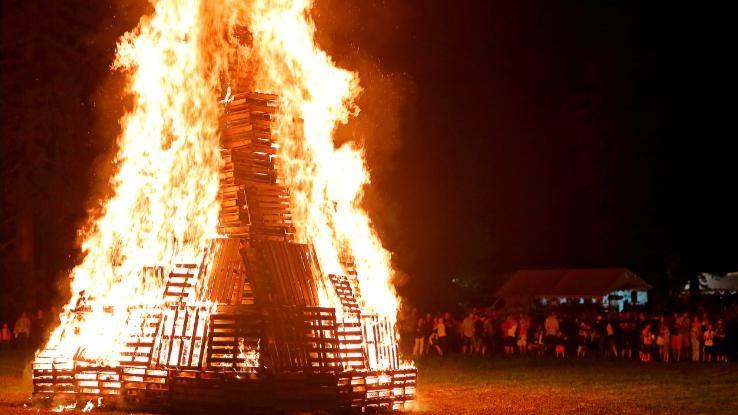
Another tradition? In some towns, children wheel their homemade "Guys" around in wheelbarrows, asking for a "penny for the guy" to buy fireworks with. In some areas, the "penny for the guy" tradition has waned in modern times. Justine Roberts, the founder of parent and family-centric site Mumsnet, explained, "It's not that children don't get excited, go out in the dark, and ask strangers for gifts; it's just that now, they do that on Halloween."
Modern-Day Guy Fawkes Night Regulations
Much like America's Independence Day celebrations, modern-day regulations surrounding Guy Fawkes Night celebrations have been instituted to keep revelers safe. While people used to set off fireworks — and even build bonfires — in their own backyards, most folks opt for organized events these days, as is the case with July 4 in the States.
"Back gardens aren't as big as they used to be, and people like going to an organized event for the spectacular show, the music and the atmosphere," Karl Mitchell-Sheed, director of Illusion Fireworks, explained to BBC. Of course, this doesn't completely mitigate the amount of fireworks-related injuries or scared pets.
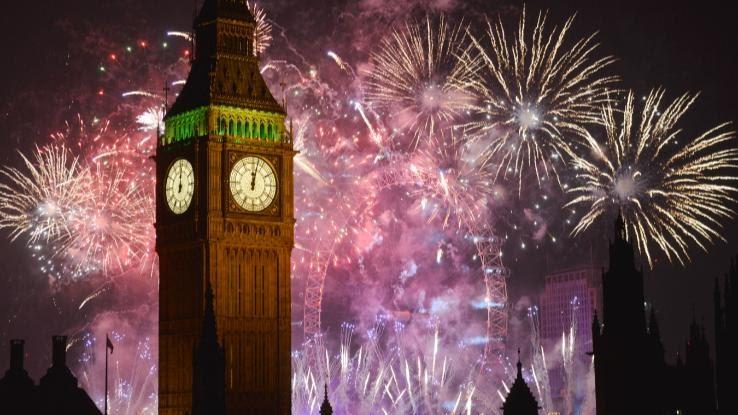
The holiday tends to be especially popular in Sussex, which hosts a whole bonfire season starting the first weekend of September and lasting through the third week of November. Events are scheduled across several weeks so that multiple "bonfire societies" have a chance to participate in each other's parades and events. Most of these so-called "bonfire societies" date back to the 1800s; each society marks a pub as its personal headquarters, and decides on a unique costume theme, featuring everything from viking-looking ensembles to striped jumpers.
What you might not expect? Well, Guy Fawkes, who inspired the titular anarchist fighting an oppressive government in 2005's V for Vendetta , has taken on a new meaning in pop culture — in large part due to the dystopian film — and has even inspired modern-day protestors of all sorts. Regardless of their opinions on Fawkes, crowds of thousands flock to these Bonfire Night festivals — because, when you get down to it, nothing says "November" like a flame-warmed bowl of soup, massive bonfires, and government-sanctioned explosives.
Source: https://www.reference.com/history/guy-fawkes-night?utm_content=params%3Ao%3D740005%26ad%3DdirN%26qo%3DserpIndex&ueid=117ec613-62f8-4f99-a8df-4605725f8e75
0 Response to "What Does It Mean for a Guy to Call You Continuously After a Night One Stand"
Post a Comment